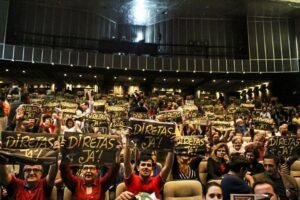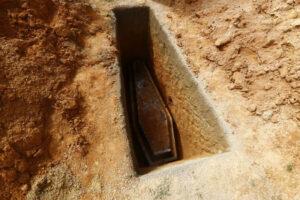Brazil: Power in the Streets, Targeted Violence in the Countryside
Our hearts go out to those impacted by the devastating flooding in Brazil’s northeastern states of Pernambuco and Alagoas right now.
The Brazilian political crisis and ensuing violence have intensified rapidly since the institutional coup of August 31, 2016. At Grassroots, we are receiving regular reports from our partners in Brazil listing incidents of attacks, arrests and even assassinations of land rights activists in a wave of right-wing aggression.
In a powerful showing of resistance on May 24, over 200,000 demonstrators took to the streets of Brasilia as part of #OcupaBrasilia («Occupy Brasilia»). Together they called for the resignation of post-coup president Michel Temer, for immediate direct election, and for an end to neoliberal reforms (especially their opposition to labor, social security and pension reforms) being voted on in Congress.
In response, the Temer government called out armed forces to crack down on the demonstrators. The violence was brutal, and more than 50 people were injured. Clementino, an activist and leader with the Landless Workers Movement (MST), was wounded when he was shot in the face with a rubber bullet. He is in the hospital and may lose his sight.
A Grassroots International partner organization, the Landless Workers’ Movement (MST) was one of the main organizers of last week’s demonstration. People from many Brazilian social movements participated in the protests, including the Unified Workers Central (CUT), the Brazil Popular Front (Frente Brasil Popular) and People Without Fear (Povo Sem Medo). All of these groups are part of the Popular Brazilian Front (Frente Brasil Popular), a national movement defending democracy and demanding a new economic policy that prioritizes social movements, unions, Indigenous peoples, Quilombolas (Afro-descendants), people of color, the LGBTQ community and women- and youth-led organizations. Grassroots International partner organizations Movement of People against Dams (MAB) and the Popular Peasant Movement (MCP) are part of the Frente Brasil Popular.

Reacting to the violent state response, the Frente Brasil Popular released this statement:
«The use of the Armed Forces, tear gas bombs and rubber bullets demonstrates the current weakness of the government of Michel Temer and his allies, all the more unstable after the innumerable allegations of corruption involving the President himself.»
The MST released a statement denouncing the state violence:
«We also denounce and repudiate the illegal call of the Armed Forces, made for alleged protection of law and order, but which in practice established State of Exception in Brasilia until May 31. This extreme expression of authoritarianism is completely absurd and unjustifiable, and its immediate revocation is indispensable. Finally, the MST stands in solidarity with the militants who have also suffered from this violent attack on popular movements. This only reinforces the need for direct elections now!»
The Brasilia demonstrations came on the heels of another massive march of over 20,000 in Sao Paolo on May 21 demanding «Fora Temer» (Out with Temer).
Together, all of these groups are rejecting President Temer’s refusal to step down following corruption allegations. Last week the Supreme Court released audio in which President Temer discusses bribes encouraging Joesley and Wesley Batista, two brothers who run the meat-processing company JBS, to continue payments to his former ally, Eduardo Cunha, in order to buy his silence, while he was being investigated in the country’s largest corruption investigation, Operation Car Wash. Temer’s administration has been embroiled in corruption scandals since he came into power last year after ousting Vilma Rousseff in what many in Brazil and internationally have labelled a parliamentary coup.
Human Rights Crisis
As the army took the streets of Brasília against the Brazilian people, the military police of the state of Pará committed even worse crimes: a slaughter of rural workers. Ten farmers were murdered in Pará last week.
On May 24, Brazilian police killed nine men and one woman when they arrived at the Santa Lucia farm, which a group of landless activists that included 150 families had invaded two years ago.

According to initial information from Reuters, Para state police said in a statement that they were acting on a local judge’s order to remove the families from the private land, and also carry out 14 arrest warrants in connection to the murder last month of a security guard employed by the ranch owner.
Just over a month ago, the Catholic Church’s Pastoral Land Commission (Comissão Pastoral da Terra, or CPT) released its annual report, Conflicts in the Countryside: Brazil 2016 (see the publication, in Portuguese), in which it highlighted the 61 murders of rural workers that happened last year, the highest number on record since 2003 and double the average for the last ten years. The report also highlights 1,536 conflicts involving almost one million families.
Sadly, violence is intensifying this year. On April 19, nine men were shot or stabbed to death in a remote area of Mato Grosso state, and on April 28, during a peaceful land occupation of ancestral territory by the Gamela people, land that is currently under the control of cattle ranchers, thirteen Indigenous people were brutally attacked by some of those ranchers, leaving many hospitalized. Police officers reportedly stood by as the attacks happened.
In the first five months of 2017, the Pastoral Land Commission (CPT) has recorded 26 murders as a result of agrarian conflicts in Brazil, a rate twice as high as the first half of 2016 — and the highest murder rate tracked by the CPT in its 25 years of record keeping. In addition to the 26 murders, six other cases are under investigation.
For more context on the targeting of land and environmental defenders in Brazil, check out the 2015 Global Witness report «On Dangerous Ground.»
Grassroots International stands in solidarity with our Brazilian partners. Stay tuned here on our blog for updates.

